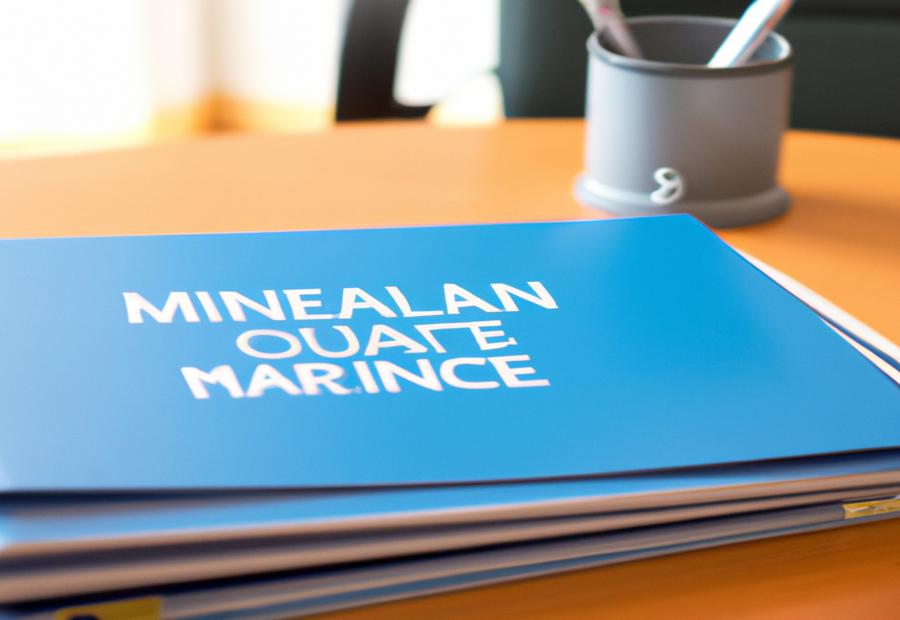Key Takeaways:
- Maine Teachers Retirement is a defined benefit pension system that provides retirement benefits to qualified teachers in Maine.
- Qualification for a pension in Maine requires meeting certain requirements, such as a minimum number of years of service and reaching a specific age.
- The pension amount is calculated based on a teacher’s years of experience and final salary, providing a stable source of income during retirement.
Related Post:
Connecticut Teachers Retirement
Introduction
Photo Credits: Ecopolitology.Org by Frank Harris
Discover the key to effective data categorization with the MECE principle in the context of Maine Teachers Retirement. Uncover the significance of this principle in organizing and analyzing data, ensuring clarity and completeness. With well-categorized data, educators and policymakers can make informed decisions to enhance the retirement system’s efficiency and support teachers in Maine.
Explanation of the MECE principle and its importance in data categorization
MECE – Mutually Exclusive & Collectively Exhaustive – is a must for data categorization. No overlapping categories & every option covered – this eliminates ambiguity & puts each piece of data in its own category.
In the Maine Teachers Retirement system, MECE is key for accurate & efficient pension info management. Categories like qualifications, calculation methods, retirement age & contributions help access & analyze info quickly & accurately.
Take qualifications for a pension in Maine, for example. Categorize them according to experience & salary, and you can easily determine who gets benefits. MECE ensures no one falls through the cracks or gets an incorrect eligibility assessment.
MECE also clarifies retirement age & early retirement options for teachers & administrators alike when planning for the future. You need to understand when you can retire, & what options are available at different stages of your career.
In conclusion, MECE is a must for the Maine Teachers Retirement system. Mutual exclusivity & collective exhaustiveness in categories like qualifications, calculations, contributions, portability considerations, MainePERS resources, state retirement system laws, etc. make data management more efficient & minimize errors.
Discover Maine Teachers Retirement: planning for your future is no joke!
Overview of Maine Teachers Retirement
Photo Credits: Ecopolitology.Org by Raymond Lopez
The Overview of Maine Teachers Retirement provides a comprehensive understanding of the Teachers’ Retirement System of the State of Illinois and its tiers, the Maine Public Employees’ Retirement System and its establishment, and the nature of Maine’s teacher pension as a defined benefit pension. Delve into the intricacies of these components and gain insight into the retirement system that supports Maine’s dedicated educators.
The Teachers’ Retirement System of the State of Illinois and its tiers
In Illinois, the Teachers’ Retirement System is responsible for managing benefits. It has a tiered structure that categorizes teachers based on their hire date. This determines their eligibility for different benefits.
- Tier 1:
- Hire Date: Before Jan 1, 2011
- Eligibility: Full benefits, including cost-of-living adjustments and health insurance subsidies.
- Contribution Rate: 9.4% of salary
- Tier 2:
- Hire Date: On or after Jan 1, 2011
- Eligibility: Benefits with reduced cost-of-living adjustments and health insurance subsidies.
- Contribution Rate: 8.0% of salary
This tiered structure is fair and sustainable. It provides an appropriate approach to managing retirement benefits for educators in Illinois.
The Maine Public Employees’ Retirement System and its establishment
The Maine Public Employees’ Retirement System was created as a pension plan for public employees in Maine, including teachers. This system provides them with financial security through employee and employer contributions.
The system allows teachers to be part of a defined benefit pension plan. Their retirement benefits are based on a formula that takes into account service years and final salary. This provides a stable source of income in retirement.
The Maine Public Employees’ Retirement System also offers resources and programs such as retirement counseling, workshops, and online tools. These help teachers plan for their future financial needs and enjoy a comfortable retirement.
Teachers must understand the establishment of this system and its impact on their retirement planning. By taking advantage of the benefits and managing personal finances well, they can have a secure and fulfilling retirement.
Maine’s teacher pension as a defined benefit pension
Maine’s teacher pension is a defined benefit one. This means that retirement benefits are based on formulas and calculations. The Teachers’ Retirement System of the State of Illinois has tiers. The Maine Public Employees’ Retirement System oversees Maine’s teacher pension. To qualify, teachers must meet requirements such as years of service and age. The pension amount is based on factors like experience and salary. Early retirement is an option, but this may lead to reduced benefits. Both teachers and the state contribute to fund the pension. However, portability is a challenge. If a teacher moves or changes careers, they may lose some or all of their benefits. It is important for teachers to understand these aspects when planning retirement in Maine and making career decisions.
Qualification and Benefits
Photo Credits: Ecopolitology.Org by Stephen Martinez
To better understand the qualification and benefits of Maine Teachers Retirement, let’s explore the requirements for qualifying for a pension, how the pension is calculated based on years of experience and final salary, the retirement age and early retirement options, as well as the contributions made by teachers and the state. This section provides insightful information on the eligibility criteria and the monetary aspects of the retirement system for Maine teachers.
Requirements for qualifying for a pension in Maine
For a pension in Maine, individuals must fulfil certain criteria set by the Maine Teachers Retirement system. These rules decide who gets retirement perks and are vital for retirement planning.
- Years of Service: To qualify, teachers must have a certain number of years of service. This amount varies on the person’s circumstances.
- Membership: To be eligible, they must be part of the Maine Teachers Retirement system. This means being an active contributor throughout their career.
- Age: They must meet age requirements to qualify for a pension in Maine. This ensures they have reached a specific point in their career before retiring.
- Final Salary Calculation: The pension amount may depend on the final salary as a teacher. This looks at experience and position held.
- Contributions: Teachers must make payments to the retirement system during their career, which helps fund pensions. Generally, these are taken from salary.
Plus, there might be other factors that impact eligibility for a pension in Maine. It’s important for teachers to examine and understand these details for a successful retirement plan. By meeting all the requirements, they can receive the benefits they deserve from the Maine Teachers Retirement system.
Calculate your pension! Years of toil and high salaries come together to give you retirement dreams.
Calculation of pension based on years of experience and final salary
In Maine, calculating a teacher’s pension involves two major factors: their years of experience and final salary. This 5-step guide explains how to do it:
- Count up all their teaching years, both full-time and part-time.
- Calculate an average salary from the highest earning years (e.g. “high-three” or “high-five”).
- Use a specific formula to work out what percentage of their average salary will be paid out in pension.
- Multiply the percentage by their average salary to work out their annual pension.
- Check for extra adjustments or limitations (like early retirement options).
Other factors can also come into play, like disability retirement benefits, cost-of-living adjustments, or rules for certain groups.
MainePERS data shows that teachers who’ve contributed to their pensions for 25 years or more can get full retirement benefits under the defined benefit plan.
Retiring early in Maine is like winning the lottery… but instead of money, you get more time to moan about retirement savings!
Retirement age and early retirement options
Teachers in Maine need to meet certain requirements to get retirement benefits. Years of experience and salary are used to calculate the pension amount. Retirement age is key, it decides when one can receive payments. Early retirement options are available for those who want to retire before the usual age. Contributions from teachers and the state also affect retirement benefits. It’s essential for teachers to understand retirement age and early retirement options in the Maine Teachers Retirement system to plan their future. This includes making informed decisions about their career and financial goals.
Contributions made by teachers and the state
Teachers in Maine are required to contribute to their retirement, along with the state. The Maine Teachers Retirement System follows a defined benefit pension plan. Pension amounts are calculated based on years of experience and final salary of the teacher. Contributions from teachers and the state are crucial for providing a stable, secure source of income during retirement.
These contributions build a pool of funds used to pay out pensions to retired teachers. Teachers contribute a percentage of their salary, taken from their paycheck. The state also contributes to the retirement system.
It is important for both teachers and the state to understand and fulfill their obligations. Teachers must be aware of their contribution requirements and make timely payments. The state needs to make regular contributions too.
Both parties can consider strategies to optimize these contributions. Teachers can increase their contribution percentage or make additional voluntary contributions. They should also keep track of any changes in contribution requirements or rates.
The state can promote higher levels of contribution by offering incentives or matching programs. Regular communication about contribution requirements, rate changes, and updates related to benefits would also be beneficial.
By managing contributions from teachers and the state, the Maine Teachers Retirement system can provide a reliable source of income for retirees. It is essential for both parties to stay informed, make contributions, and explore options to enhance retirement savings. This will contribute to their financial well-being during retirement.
Portability and Impact on Retirement Savings
Photo Credits: Ecopolitology.Org by Jordan Young
When it comes to the portability of retirement benefits, Maine teachers face significant challenges that can have a lasting impact on their retirement savings. In this section, we will explore the lack of benefit portability and its potential consequences for teachers. Additionally, we will discuss important considerations that teachers need to keep in mind when planning their careers and retirement. Strap in as we delve into the complexities of retirement savings for Maine educators.
Lack of benefit portability and its consequences
The lack of benefit portability in the Maine Teachers Retirement system can have serious implications. If a teacher moves to a different state or changes jobs, they may not be able to move their pension benefits. This could mean a loss of retirement savings and financial hardship.
Also, different states have different pension systems with various requirements and benefits. This confusion can make it difficult to plan for retirement.
Lastly, it can even affect Social Security benefits. The Windfall Elimination Provision (WEP) or Government Pension Offset (GPO) might reduce Social Security benefits for teachers receiving pension from the Maine Teachers Retirement system.
It is essential for teachers to be aware of the consequences of the lack of benefit portability. They should understand the details of their pension system and seek other retirement options. MainePERS offers information and resources to help teachers make wise decisions about their careers and finances.
Considerations for teachers regarding career plans and retirement
Maine teachers, if you’re planning your career and retirement, you must factor in a few key points.
Maine Teachers Retirement system doesn’t have benefit portability, meaning if you move or leave the profession, you can’t transfer your pension. This could have a huge effect on your financial stability.
Also, become aware of what’s required to qualify for a pension. The calculation is based on years of experience and final salary, so plan ahead. Also, keep in mind the retirement age and early retirement options.
You should know about your contributions and the state’s contributions to the retirement system. You have to give a part of your salary, and the state makes contributions too. Make sure you understand how this impacts your overall savings.
Don’t forget to check out the resources and programs provided by MainePERS. These include retirement benefits specifically for teacher members, as well as other services and options that can help your retirement planning. It’s essential to explore these resources to make informed decisions.
Don’t get caught off guard in Maine – learn about Maine Teachers Retirement system and plan ahead, or else you might be paying for it later.
MainePERS Resources and Programs
Photo Credits: Ecopolitology.Org by Gerald Wilson
Discover the wealth of resources and programs offered by MainePERS to support teachers in their retirement journey. Explore the retirement benefits provided by MainePERS and learn about the additional services and options available exclusively to teacher members. Uncover the impact that MainePERS benefits can have on Social Security retirement benefits. Gain valuable insights and make informed decisions about your future as a teacher in Maine.
Retirement benefits provided by MainePERS
Unlock a treasure trove of options and benefits with MainePERS! Eligible members can gain financial security for their retirement years. Teacher members can look forward to awesome rewards that come with retirement.
Additional services and options available to teacher members
Teacher members of the Maine Teachers Retirement system have access to extra services and options which can increase their retirement benefits. These offerings are designed to give teachers a helping hand as they plan for retirement.
- Retirement Planning Resources: MainePERS offers resources and tools to help teachers through the process of retirement planning. These include personalised benefit estimates, tutorials, and online calculators to enable teachers to make informed decisions about pension benefits.
- Healthcare Benefits: Teacher members may have access to healthcare benefits through the retirement system. MainePERS provides information on available healthcare plans and instructions on how to enrol in them. These benefits are especially important for teachers who retire before they are eligible for Medicare.
- Optional Retirement Programs: In addition to a traditional pension, teacher members may have the option to join optional retirement programs offered by MainePERS. These programs allow members to contribute more funds to their retirement savings and give more flexibility in how these funds are invested.
These services give teacher members of the Maine Teachers Retirement system valuable support and freedom. By taking advantage of these resources, teachers can properly prepare for their retirement and gain a secure financial future.
MainePERS benefits can have a remarkable effect on Social Security retirement benefits – like discovering a retirement bonus when doing laundry!
Impact of MainePERS benefits on Social Security retirement benefits
MainePERS benefits can affect Social Security retirement benefits. When a Maine teacher participates in MainePERS, their pension may change the amount of Social Security they receive in retirement. It’s important to know the implications and plan accordingly.
The interaction between MainePERS and Social Security can be tricky. Social Security looks at a person’s earnings history, while MainePERS offers a pension based on experience and salary. Both systems combine to determine retirement income.
The law may reduce or adjust Social Security if they also have a MainePERS pension. The Windfall Elimination Provision (WEP) is a possible example, reducing the Social Security benefit for those with pensions not covered by Social Security.
It’s essential for teachers to consider these effects when planning for retirement. They should consider both MainePERS benefits and how it impacts Social Security payments. By understanding how these systems work together, teachers can plan for their financial future in retirement.
Knowing MainePERS’ impact on Social Security retirement is important for Maine teachers. By understanding the interaction and planning accordingly, they can make informed decisions and maximize their retirement income.
Maine State Retirement System Laws
Photo Credits: Ecopolitology.Org by Patrick Young
The Maine State Retirement System Laws shed light on important aspects related to teacher retirement in Maine. In this section, we will explore the responsibility of remitting employer contributions for teacher retirement and uncover any exceptions based on funding sources. Additionally, we will delve into the detailed explanation of exempt state funds and how they are allocated within the retirement system. Get ready for an informative dive into the intricacies of Maine’s teacher retirement regulations!
Responsibility for remitting employer contributions for teacher retirement
Employers in Maine have the responsibility to remit contributions for teacher retirement. This means giving money to their employees’ retirement funds. Doing this is important for giving teachers financial security in their old age.
Employers must make regular contributions to the Maine Teachers Retirement System. These back the pension benefits teachers get when they retire. It’s vital for employers to do this promptly and carefully, so teachers can depend on their retirement income.
In addition, employers may have certain rules about how to remit contributions. These may include deadlines, details about amounts, and paperwork or documents needed. Employers should know their duties and follow all regulations to support their employees’ retirement.
By remitting employer contributions, employers help give teachers a steady source of income after they retire. This not only helps teachers, but shows appreciation for their work in teaching future generations. Employers should prioritize their contributions and collaborate with the Maine Teachers Retirement System for a smooth process.
Retirement funds are hard to make when sources hide away.
Exceptions to employer retirement costs based on funding sources
Some employers in Maine may be exempt from teacher retirement costs if their funding comes from particular sources. These exceptions could free up certain employers, such as those with federal grants or endowments, from the economic burden of supporting teacher pensions.
Exceptions may also apply to certain employee types within an organization. For example, part-time or temporary teachers might not be expected to have employer contributions, depending on the funding source.
Furthermore, exceptions could be provided to employers who’ve already given substantial contributions to alternate retirement plans for their teachers. This is to avoid double contributions and guarantee fairness in retirement savings arrangements.
It’s key to understand these exceptions for both employers and teachers in the Maine Teachers Retirement System. It allows them to comprehend the complexities of retirement planning and make educated decisions about their fiscal future. By looking into these exceptions, individuals can evaluate the effect of different funding sources on their retirement savings and modify their career plans accordingly.
Detailed explanation of exempt state funds and their allocation
Exempt state funds play a key role in the Maine Teachers Retirement system. They’re not subject to certain rules or restrictions. They’re allocated strategically to fund initiatives and programs. Careful consideration is taken to ensure sustainability and effectiveness.
These funds help retired teachers, provide investment returns and support overall funding needs. They’re invested in portfolios such as stocks and bonds. Returns are used to fulfill pension payouts and sustain financial health.
They also fund administrative expenses, technology infrastructure and staffing needs. Plus, they may be put towards special programs to boost retirement benefits or provide extra resources for retired teachers.
Through this allocation process, teachers can understand how these funds contribute to their retirement benefits. That way, they can plan for a secure financial future.
Conclusion
Photo Credits: Ecopolitology.Org by Thomas Adams
The Maine Teachers Retirement system is a must-have in Maine’s education world. It provides a generous and stable pension plan that is attractive to educators and offers retirees financial security. It’s ongoing adjustments and upgrades show its dedication to supporting teachers and retirees.
This pension plan, made for Maine educators, is an important source of income during retirement. It’s robust benefits and financial stability make it a key element of the state’s education system. It lures in and keeps talented teachers, guaranteeing quality learning for students and stability in schools.
Moreover, the Maine Teachers Retirement system looks after its retirees too. Its long-term investment strategies secure a sustainable income stream in their years away from work. This gives them peace of mind that they won’t have financial issues in their golden years.
Furthermore, the system has been improved over the years. Its reviews and analyses have modified it to meet the changing needs of teachers and retirees, making it even more dependable.
Some Facts About Maine Teachers Retirement:
- ✅ Maine Teachers Retirement System is the largest public retirement system in Maine, established in 1942. (Source: maine207.org)
- ✅ Maine teachers are part of the Maine Public Employees’ Retirement System, which includes all state employees. (Source: maine207.org)
- ✅ Maine’s teacher pension is a defined benefit (DB) pension, where the value of the pension is determined by a formula based on years of experience and final salary. (Source: maine207.org)
- ✅ Teachers need to serve a minimum of 5 years to qualify for a pension in Maine. (Source: maine207.org)
- ✅ Teacher pensions in Maine are not portable, meaning teachers cannot take their benefits with them if they leave the Maine Public Employees’ Retirement System. (Source: maine207.org)
FAQs about Maine Teachers Retirement
Who qualifies for a teacher pension in Maine?
In Maine, teachers need to serve a minimum of 5 years to qualify for a pension.
How are teacher pensions calculated in Maine?
Maine’s teacher pension is a defined benefit (DB) pension, where the value of the pension is determined by a formula based on years of experience and final salary. The final salary is calculated based on the highest 3 years average salary.
What are the benefits of membership in MEA-Retired?
MEA-Retired, an organization that promotes the economic, professional, and social welfare of retired educators, provides information and resources for retired teachers. They offer support, networking opportunities, access to dental plans, and a calendar of events.
How much does Maine’s teacher pension plan cost?
In 2018, teachers in Maine contributed 7.65% of their salary to the pension fund, while the state contributed 19.92%. The total contribution to the pension fund was 27.57% of the teacher salary.
What is the retirement age and service requirement for full benefits in Maine?
The retirement age to start collecting full benefits is 65 years with at least 1 year of service.
Can teachers transfer their MainePERS benefits if they leave the Maine Public Employees’ Retirement System?
No, teacher pensions in Maine are not portable. Teachers cannot take their benefits with them if they leave the Maine Public Employees’ Retirement System.

.jpg)








